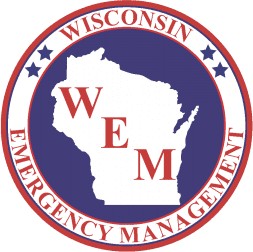 Gov. Scott Walker opens the 6th Annual Governor’s Cybersecurity Summit Sept. 10 at the University of Wisconsin campus. Attendees heard from a wide range of experts on current and potential future cybersecurity threats. The annual summit brings together people working in several fields that rely on technology in their daily operations. Wisconsin National Guard photo by Staff Sgt. Manda Walters
Gov. Scott Walker opens the 6th Annual Governor’s Cybersecurity Summit Sept. 10 at the University of Wisconsin campus. Attendees heard from a wide range of experts on current and potential future cybersecurity threats. The annual summit brings together people working in several fields that rely on technology in their daily operations. Wisconsin National Guard photo by Staff Sgt. Manda Walters
MADISON, Wis. — Cybersecurity is a journey, not a destination. That was the message Monday at the 6th Annual Governor’s Cybersecurity Summit, held on the University of Wisconsin-Madison campus. The summit brought together more than 350 business owners, information technology professionals, and students to learn more about the current threats facing Wisconsin’s cyber landscape and what is being done to address them.
Gov. Scott Walker opened the summit by highlighting the scope of the danger facing state government.
 Maj. Gen. Don Dunbar, Wisconsin’s adjutant general and the state’s homeland security advisor, speaks during the 6th Annual Governor’s Cybersecurity Summit Sept. 10 at the University of Wisconsin campus. Attendees heard from a wide range of experts on current and potential future cybersecurity threats. The annual summit brings together people working in several fields that rely on technology in their daily operations. Wisconsin National Guard photo by Staff Sgt. Manda Walters
Maj. Gen. Don Dunbar, Wisconsin’s adjutant general and the state’s homeland security advisor, speaks during the 6th Annual Governor’s Cybersecurity Summit Sept. 10 at the University of Wisconsin campus. Attendees heard from a wide range of experts on current and potential future cybersecurity threats. The annual summit brings together people working in several fields that rely on technology in their daily operations. Wisconsin National Guard photo by Staff Sgt. Manda Walters
“Over the past year, we have had 1.7 million times a day where cyber criminals have tried to open the door by scanning or by trying to compromise state systems,” Walker said. “There are 870,000 suspicious emails blocked each day that could have compromised state systems.”
Maj. Gen. Don Dunbar, Wisconsin’s adjutant general and the state’s homeland security advisor, discussed many of the cybersecurity issues the state has responded to in the last year, along with how state agencies have worked with the private sector to develop response strategies.
 Greg Engle, Wisconsin Emergency Management’s director of planning and preparedness, speaks during a panel discussion about last year’s “Dark Sky” cyber attack exercise as part of the 6th Annual Governor’s Cybersecurity Summit Sept. 10 at the University of Wisconsin campus. Attendees heard from a wide range of experts on current and potential future cybersecurity threats. The annual summit brings together people working in several fields that rely on technology in their daily operations. Wisconsin National Guard photo by Staff Sgt. Manda Walters
Greg Engle, Wisconsin Emergency Management’s director of planning and preparedness, speaks during a panel discussion about last year’s “Dark Sky” cyber attack exercise as part of the 6th Annual Governor’s Cybersecurity Summit Sept. 10 at the University of Wisconsin campus. Attendees heard from a wide range of experts on current and potential future cybersecurity threats. The annual summit brings together people working in several fields that rely on technology in their daily operations. Wisconsin National Guard photo by Staff Sgt. Manda Walters
“We’re trying to stay one step ahead,” Dunbar said. “We have learned it’s not just software, not just hardware, it’s collaboration among the men and women who do this for a living.”
Dunbar also directly addressed the threat posed by countries such as Russia, accusing them of trying to “sow seeds of doubt” about the outcome of elections.
“We can’t have that. We have to trust our elections,” Dunbar said. “And I’m telling you that you can trust the elections here in Wisconsin,” he argued, pointing to the continued use of paper ballots in the state as allowing the state to fairly audit the result of its elections.
Attendees heard from a wide range of experts on current and potential future cybersecurity threats, such as Christina “CK” Kerley, an expert on emerging technology trends, and a panel discussion on meeting the job needs of the cybersecurity industry and the use of “blockchain” formatting to protect data.
 David Cagigal, the state of Wisconsin’s chief information officer, and Maj. Gen. Don Dunbar, Wisconsin’s adjutant general and the state’s homeland security advisor, interact with a lunchtime breakout session during the 6th Annual Governor’s Cybersecurity Summit Sept. 10 at the University of Wisconsin campus. Attendees heard from a wide range of experts on current and potential future cybersecurity threats. The annual summit brings together people working in several fields that rely on technology in their daily operations. Wisconsin National Guard photo by Staff Sgt. Manda Walters
David Cagigal, the state of Wisconsin’s chief information officer, and Maj. Gen. Don Dunbar, Wisconsin’s adjutant general and the state’s homeland security advisor, interact with a lunchtime breakout session during the 6th Annual Governor’s Cybersecurity Summit Sept. 10 at the University of Wisconsin campus. Attendees heard from a wide range of experts on current and potential future cybersecurity threats. The annual summit brings together people working in several fields that rely on technology in their daily operations. Wisconsin National Guard photo by Staff Sgt. Manda Walters
Officials from Wisconsin Emergency Management (WEM), the state Division of Enterprise Technology, the Wisconsin Department of Transportation, and Madison Gas & Electric discussed the state’s “Dark Sky” exercise. Part of the simulation involved different cyber threats facing the electric grid and tested the response to those scenarios.
Greg Engle, director of Planning and Preparedness at WEM, said the panel discussion was an opportunity to highlight the lessons learned from the exercise, such as the importance of collaborating response efforts.
“It plays a huge role, because you can do internal training,” Engle said, “but it’s that working together, it’s understanding what a utility’s needs are, so that we can make sure that we are responding in support of them.”
“The whole purpose was to see how far we can go before we fail,” Dunbar said of the Dark Sky exercise during his opening remarks at the summit. “Let’s see how difficult it can be if the utilities were going down. If cities were going down. How do we communicate — how would we get these systems back up? How do we collaborate with the utilities and give them the support they need as they try and get the grid back up?”
The annual summit brings together people working in several fields that rely on technology in their daily operations. Todd Tupper with SC Data Center said he has been to conference three times now, which he called an excellent local opportunity to network and learn.
“You get an idea of what’s going on in the state, make some contacts, and learn about relevant topics to keep fresh in the industry,” he said.
Several students were in attendance for a chance to learn more about the career opportunities that may exist in cybersecurity-related field and what challenges they may face in those jobs. David Stewart, a junior studying computer science at UW-Madison, said he was encouraged to attend by a past participant.
“It’s a good way to get our feet wet in the industry and experience a real-world perspective of what’s going on,” he said. “I think it’s a good way for students to just kind of get acclimated to the community.”

